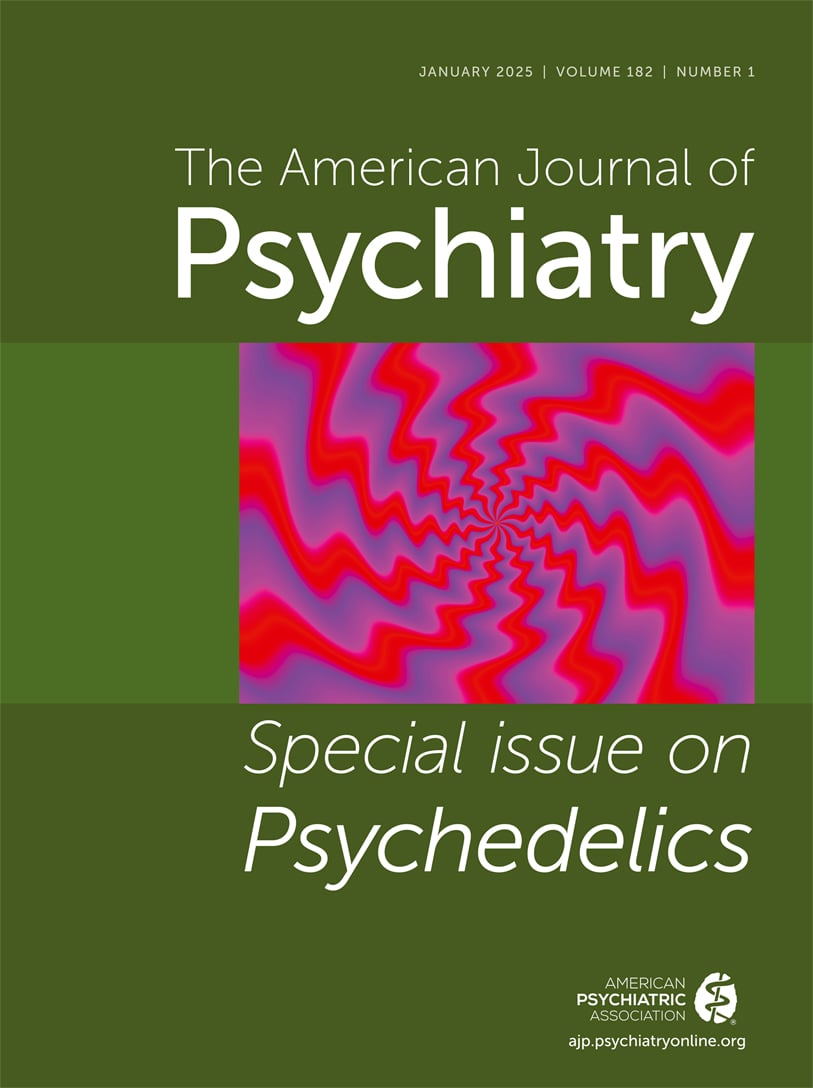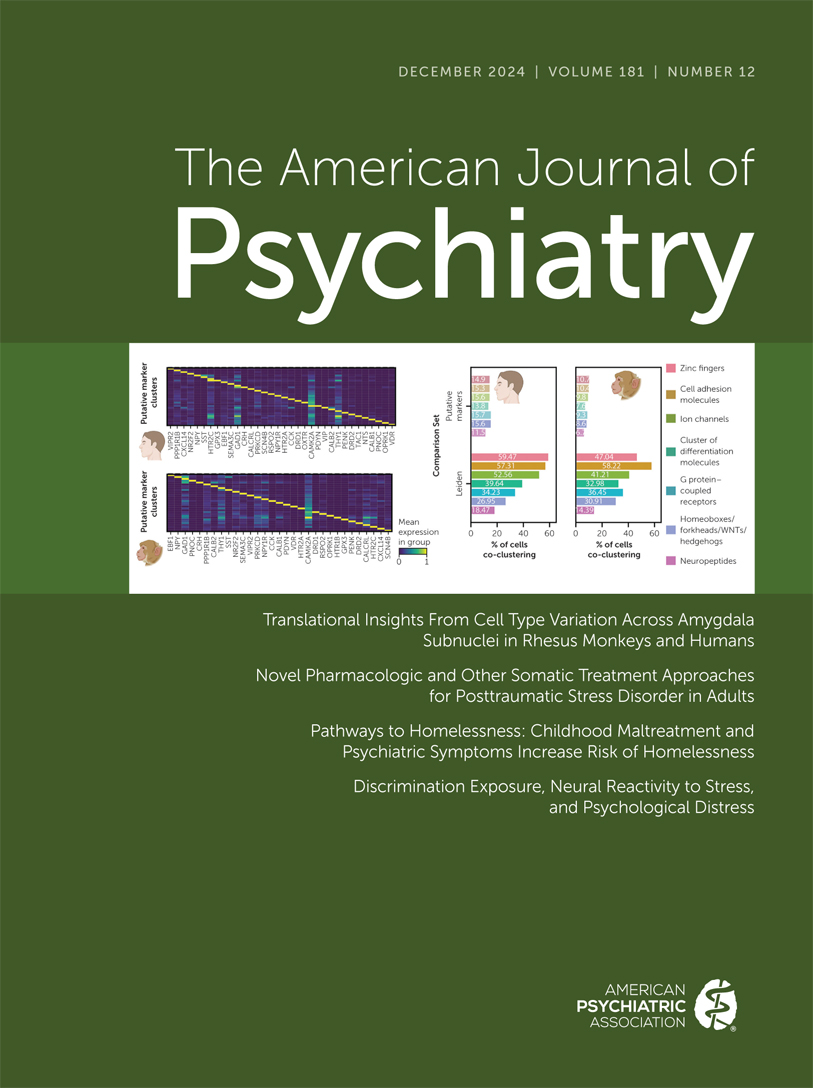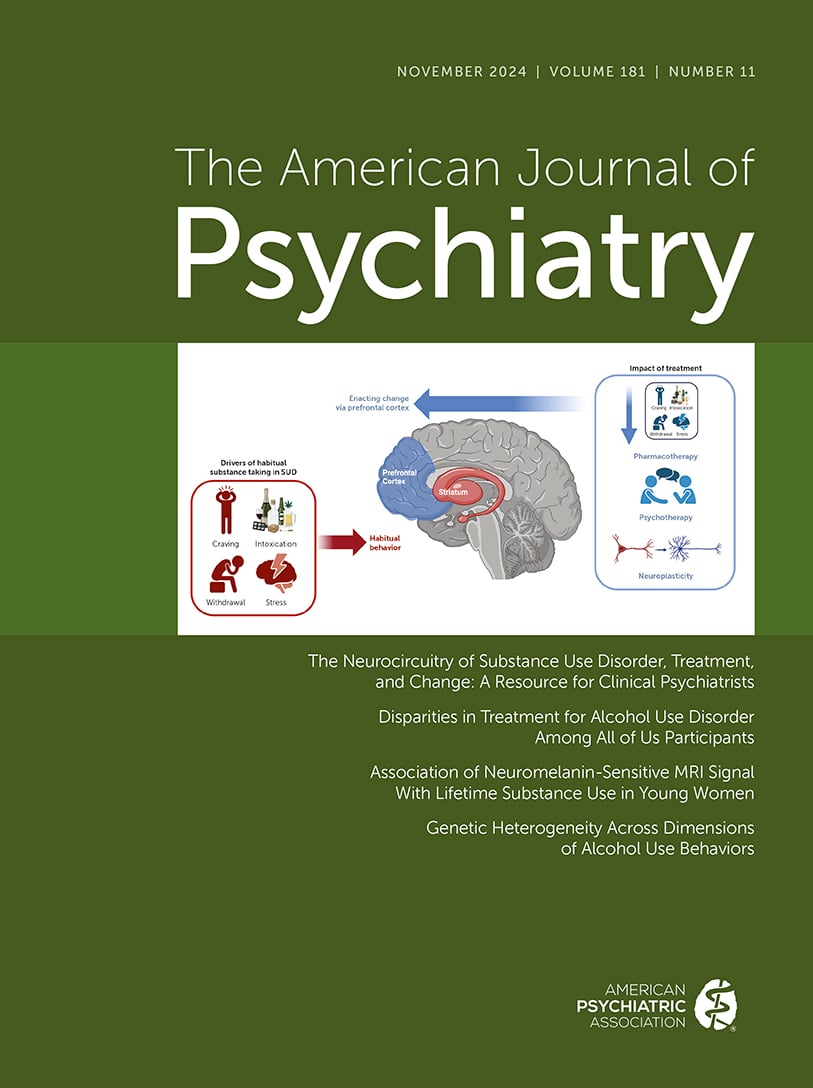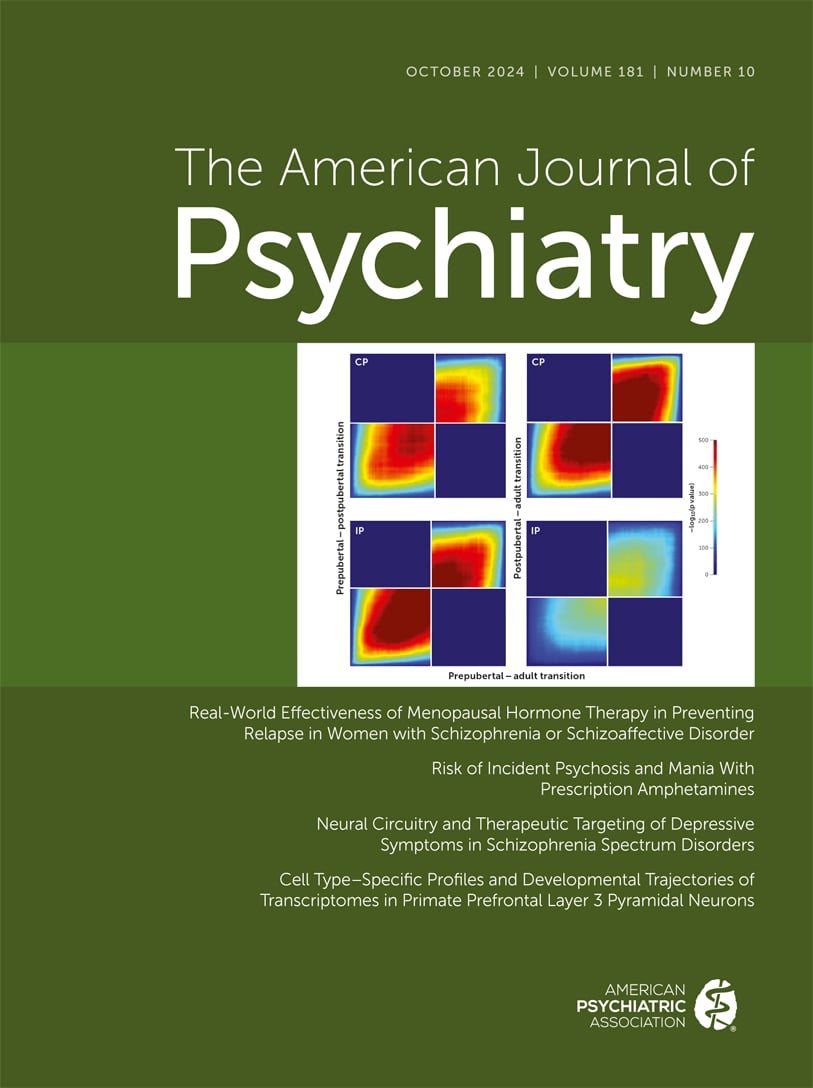American Journal of Psychiatry
- Volume 131
- Number 10
- October 1974
Article
Publication date: 01 October 1974
Pages1073–1078The author outlines the three predominant conceptualizations of hysteria: that described by Briquet in 1859 and revived by current researchers; hysteria as a conversion symptom; and the idea of the hysterical personality. He also reviews psychoanalytic ...
https://doi.org/10.1176/ajp.131.10.1073Publication date: 01 October 1974
Pages1079–1088The author sketches the historical development of health insurance in the U.S., noting how the social, technological, and financial constraints on the treatment of mental illness during the early years of private health insurance led to gaps in ...
https://doi.org/10.1176/ajp.131.10.1079Publication date: 01 October 1974
Pages1089–1092The author reports that high intake of caffeine ("caffeinism") can produce symptoms that are indistinguishable from those of anxiety neurosis, such as nervouness, irritability, tremulousness, occasional muscle twitchings, insomnia, sensory disturbances, ...
https://doi.org/10.1176/ajp.131.10.1089Publication date: 01 October 1974
Pages1093–1096Privilege for the psychotherapist is a technical necessity for certain forms of psychotherapy. Psychiatrists are not legally protected from being compelled, in certain situations, to divulge information; therefore, their patients are in danger of either ...
https://doi.org/10.1176/ajp.131.10.1093Publication date: 01 October 1974
Pages1097–1102The authors gathered data on the drug abuse patterns and social backgrounds of 833 Navy enlisted men (764 white and 69 black) admitted to a drug rehabilitation center. Black subjects reported better school adjustment, less delinquency, and fewer ...
https://doi.org/10.1176/ajp.131.10.1097Publication date: 01 October 1974
Pages1103–1106Projective identification is a mechanism that has been described by many observers from different perspectives in a variety of settings. It has been most frequently associated with rather disturbed families as an interpersonal mechanism involved in ...
https://doi.org/10.1176/ajp.131.10.1103Publication date: 01 October 1974
Pages1107–1111The authors discuss the relevance of a therapist`s pregnancy to the therapeutic interaction, presenting case histories to illustrate the issues that arise. The therapist must deal with increased vulnerability, role integration, and dependency issues with ...
https://doi.org/10.1176/ajp.131.10.1107Publication date: 01 October 1974
Pages1112–1116The authors point out that there is a great need for adequate prevalence data in the planning of comprehensive community alcoholism programs and that such planning must be based on the needs of the specific community. They present a method for obtaining ...
https://doi.org/10.1176/ajp.131.10.1112Publication date: 01 October 1974
Pages1116–1121The authors believe that in the development of an effective community education and treatment program for alcoholism the following dimensions need to be assessed: 1) attitudes toward alcohol use and abuse; 2) drinking habits; 3) awareness of available ...
https://doi.org/10.1176/ajp.131.10.1116Publication date: 01 October 1974
Pages1121–1123The CAGE questionnaire, a new brief alcoholism screening test, was administered to all patients (N = 366; 39 percent alcoholic) admitted to a psychiatric service over a one-year period. The authors indicate that the CAGE questionnaire is not a sensitive ...
https://doi.org/10.1176/ajp.131.10.1121Publication date: 01 October 1974
Pages1123–1130The author reports on a study that examined the effects of social influence on the initiation, maintenance, and termination of drinking in a group of four men who were chronic alcoholics. These men made decisions in a group setting about alcohol and ...
https://doi.org/10.1176/ajp.131.10.1123Publication date: 01 October 1974
Pages1130–1133The author reports that the percentage of manic-depressive patients admitted to an acute care psychiatric service who were also diagnosed as alcoholic was not significantly different from the rate of alcoholism for the entire psychiatry service. ...
https://doi.org/10.1176/ajp.131.10.1130Publication date: 01 October 1974
Pages1134–1136In a psychodynamic discussion of why sexual relationships between physician and patient are not therapeutically beneficial, the author explores the concept of the physician as parent surrogate and its relationship to the incest taboo, the need to be loved,...
https://doi.org/10.1176/ajp.131.10.1134Publication date: 01 October 1974
Pages1137–1139Two decades ago psychiatrists were trained by a few charismatic, humanistic clinicians who did not have much to do with laboratories or fund raising. After World War II academic psychiatry was transformed, largely by federal money, into a multidimensional ...
https://doi.org/10.1176/ajp.131.10.1137Publication date: 01 October 1974
Pages1140–1141For many years the author has been interested in understanding the ubiquitous human practice of imposing suffering upon oneself. Worry is a good example of self-inflicted suffering; it is so commonly experienced that it provides anyone who cares to ...
https://doi.org/10.1176/ajp.131.10.1140Publication date: 01 October 1974
Pages1142–1144The authors tested a three-level approach to auditing charts of psychiatric patients (review by clerks, research assistants, and clinical consultants) against two other methods. There were no significant differences among the three methods in scores of ...
https://doi.org/10.1176/ajp.131.10.1142Publication date: 01 October 1974
Pages1145–1147The author presents a method of information storage and retrieval for psychiatric literature, based on dividing journals into component articles and filing by subject matter. He proposes that use of this system will result in significant savings of time ...
https://doi.org/10.1176/ajp.131.10.1145Publication date: 01 October 1974
Pages1147–1150The authors describe a course in the history of psychiatry in which patients' autobiographies are used to illustrate different eras and approaches to the treatment of the mentaly ill. They feel that this approach highlights recurrent historical themes and ...
https://doi.org/10.1176/ajp.131.10.1147Publication date: 01 October 1974
Pages1150–1152Although prison populations have been shown to be susceptible to all psychiatric disorders, psychiatry in correctional institutions is a very young branch of the discipline; its treatment approach and philosophy are still evolving. The author presents one ...
https://doi.org/10.1176/ajp.131.10.1150Past Issues
View Issues Archive
Vol. 182 | No. 1

Vol. 181 | No. 12

Vol. 181 | No. 11
